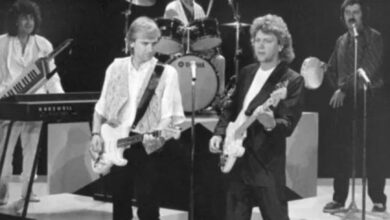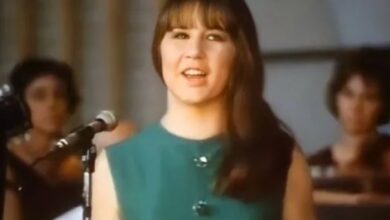The Kinks’ “You Really Got Me” Ignites a Rock Revolution and Defines the Sound of 1964
In 1964, a thunderous riff ripped through radio speakers and forever altered the trajectory of rock music. That song was “You Really Got Me” by The Kinks, a blistering, two-and-a-half-minute explosion that fused raw aggression with primal desire. Released at a time when British music was surging across the Atlantic, the single didn’t just join the wave—it helped shape it. The track catapulted to No. 1 on the UK Singles Chart and cracked the U.S. Top 10, ushering in a new era where distortion, energy, and attitude could outshine polish and perfection. With its now-legendary guitar intro and defiant delivery, it marked one of the earliest blueprints for hard rock and even punk.
The Kinks formed in Muswell Hill, North London, around the talents of brothers Ray and Dave Davies. Ray, the elder sibling, was the reflective songwriter and moody frontman, while Dave, the younger and wilder of the two, brought fiery guitar energy and teenage angst. Their early influences were steeped in American R&B, blues, and rockabilly, yet what they created felt entirely British in flavor and intent. Unlike the Beatles’ harmonious charm or the Rolling Stones’ blues swagger, The Kinks came out swinging with something more jagged, more urgent, and unmistakably rebellious.
The story behind “You Really Got Me” begins with Ray Davies’ desire to write a song that captured obsessive, almost uncontrollable desire. Drawing on a pounding piano motif inspired by jazz and blues, Ray crafted lyrics that conveyed a sense of emotional desperation. But it was Dave who added the sonic edge that gave the song its fire. In a now-mythic tale, he slashed the speaker cone of his Elpico amplifier with a razor blade and poked it with a pin to achieve the song’s gritty distortion. That aggressive guitar tone became the heartbeat of the record—raw, unfiltered, and absolutely revolutionary.
Recorded at IBC Studios in London, the session for “You Really Got Me” was far from ordinary. After a failed first attempt that Ray believed lacked the necessary intensity, the band re-recorded it under the guidance of producer Shel Talmy. Dave’s sliced-up amp produced a sound no one had ever captured before in a studio, especially not in a pop single. The track featured a minimal arrangement—guitar, bass, drums, piano, and vocals—but its impact was seismic. Ray’s shouted vocals, Dave’s distorted riff, and Mick Avory’s pounding drums created a sonic assault that would later be viewed as the moment rock ‘n’ roll truly got dangerous.
Upon its release in August 1964, “You Really Got Me” was a revelation. It shot to No. 1 in the UK within weeks, displacing more polished pop hits with its raw, almost garage-band ferocity. When it crossed over to the U.S., it reached No. 7 on the Billboard Hot 100—a major achievement for a British band at the time. Critics and fans alike were stunned by the sheer power of the track. It was a statement—a defiant roar from the underbelly of London that told the world rock music had evolved, and it wasn’t going to behave.
Culturally, the song arrived at a pivotal moment. The early ’60s had seen the rise of polished pop and surf rock, but “You Really Got Me” broke the mold. It was aggressive, dirty, and unapologetically loud. The distorted power chord intro would influence countless musicians, setting the stage for the evolution of hard rock, punk, and heavy metal. It also played a key role in redefining what British Invasion music could sound like—less about charm, more about challenge.
For The Kinks, the song’s success was transformative. Almost overnight, they went from scrappy upstarts to headlining sensations. It opened the doors for a string of hits like “All Day and All of the Night,” “Tired of Waiting for You,” and eventually more reflective works such as “Waterloo Sunset” and “Lola.” The song proved that The Kinks didn’t have to follow anyone’s formula—they could forge their own path, both musically and lyrically. It also gave Ray the confidence to pursue more ambitious songwriting, while Dave became recognized as a pioneering guitar hero.
Its influence rippled throughout the rock world. Pete Townshend of The Who credited it with inspiring his own aggressive playing style, and countless garage bands in the U.S. took notes from its simplicity and punch. The song’s signature riff was a direct precursor to hard rock and heavy metal—a lineage that includes Led Zeppelin, Van Halen, and beyond. Speaking of which, Van Halen’s explosive 1978 cover introduced the song to a whole new generation, with Eddie Van Halen’s solo adding new fire to an already incendiary track.
Over the years, “You Really Got Me” has been covered by artists ranging from The Who to The Pretenders and Mott the Hoople. Each rendition brings a new texture, but none have matched the primal energy of the original. Van Halen’s version is arguably the most famous cover, giving the song a second life on FM radio and establishing it as a rite of passage for guitarists. Yet the rawness of Dave Davies’ first take remains unmatched—a garage-born howl that no amount of technical skill can reproduce.
In the personal timeline of The Kinks, the release of this single coincided with their first brush with fame—and all its complications. The Davies brothers, known for their volatile relationship, often clashed both on and off stage. Still, the friction between them may have fueled the intensity of the band’s early work. While internal tensions would later affect the group’s consistency, in 1964 they were aligned in purpose and passion.
More than half a century later, the track remains a staple of classic rock playlists and rock history documentaries. It’s been inducted into the Grammy Hall of Fame and consistently ranks on “Greatest Songs of All Time” lists. Its opening riff is one of the most recognizable in music history, instantly conjuring a time when rock was discovering its untamed soul.
The song also shifted how music producers approached rock recordings. It gave birth to the idea that imperfection—like an amp’s torn speaker—could be powerful. It laid the groundwork for punk’s DIY ethos and helped dismantle the notion that music had to be polished to be powerful. In that way, it gave voice to a generation of outsiders and rebels.
“You Really Got Me” is more than just a breakthrough single—it’s a musical landmark. It shattered the conventions of its era, giving rise to entire genres and empowering countless young musicians to turn up the volume and let their frustrations scream through six strings. For The Kinks, it was the song that changed everything. For the world, it was the moment rock music grew its first true snarl—and never looked back.





